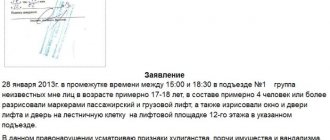An organization or individual entrepreneur may be held liable for non-payment of taxes or late payment of taxes. There are three types of liability: tax, administrative and criminal.
Which of the following types can be used in a particular case? This depends on who committed the offense of non-payment of tax - an organization or an individual entrepreneur, as well as on their status (taxpayer or tax agent).
Let's consider each type of liability to which a person can be held for non-payment or incomplete payment of tax amounts.
Tax liability... ...taxpayers
Article 122 of the Tax Code of the Russian Federation provides for liability for non-payment of tax or incomplete payment of tax amounts as a result of underestimation of the tax base, other incorrect calculation of tax or other unlawful actions (inaction) - collection of a fine in the amount of 20% of the unpaid tax amount (clause 1). For these acts committed intentionally, a fine is imposed in the amount of 40% of the unpaid tax amount (clause 3).
According to paragraph 5 of Art. 108 of the Tax Code of the Russian Federation, holding a person accountable for committing a tax offense does not relieve him of the obligation to pay (transfer) the amounts of tax and penalties due.
note
When applying the provisions of Art. 122 of the Tax Code of the Russian Federation, one should proceed from the fact that the inaction of the taxpayer, expressed solely in the failure to transfer to the budget the amount of tax indicated in the tax return or tax notice, does not constitute an offense established by Art. 122 of the Tax Code of the Russian Federation. In this case, penalties are subject to collection from him under Art. 75 of the Tax Code of the Russian Federation. This conclusion was made in paragraph 19 of the Resolution of the Plenum of the Supreme Arbitration Court of the Russian Federation dated July 30, 2013 No. 57.
Thus, if the taxpayer does not pay the tax on time, but at the same time: – calculated the tax correctly, – only a penalty will be collected from him; - he calculated the tax incorrectly, - he will be charged a fine in accordance with clauses 1, 3 of Art. 122 or clause 3 of Art. 120 of the Tax Code of the Russian Federation, as well as penalties.
Let us remind you that clause 3 of Art. 120 of the Tax Code of the Russian Federation provides for a gross violation of the rules for accounting for income and (or) expenses and (or) objects of taxation, resulting in an underestimation of the tax base, a fine in the amount of 20% of the amount of unpaid tax, but not less than 40,000 rubles. In other words, in order to avoid fines in accordance with the norms of clauses 1, 3 of Art. 122 or clause 3 of Art. 120 of the Tax Code of the Russian Federation, corrections should be made to the calculation of taxes and an updated declaration should be submitted.
Amendments to the tax return and calculations are regulated by Art. 81 of the Tax Code of the Russian Federation, which provides for cases when the taxpayer is exempt from liability.
By virtue of paragraph 1 of Art. 81 of the Tax Code of the Russian Federation, if a taxpayer discovers in the tax return submitted by him to the tax authority the fact of non-reflection or incomplete reflection of information, as well as errors leading to an underestimation of the amount of tax payable, the taxpayer is obliged to make the necessary changes to the tax return and submit an updated declaration to the tax authority in in the manner prescribed by this article.
If the “adjustment” is submitted to the Federal Tax Service before the deadline for filing a tax return, it is considered submitted on the day the updated return is submitted. According to paragraph 3 of Art. 81 of the Tax Code of the Russian Federation, if an updated declaration is submitted to the tax authority after the expiration of the deadline for filing the declaration, but before the expiration of the deadline for paying the tax, then the taxpayer is released from liability if the “adjustment” was submitted before the moment when the taxpayer learned:
– or about the discovery by the tax authority of the fact of non-reflection or incomplete reflection of information in the tax return, as well as errors leading to an understatement of the amount of tax payable; – or about scheduling an on-site tax audit.
As stated in paragraph 4 of Art. 81 of the Tax Code of the Russian Federation, if the “clarification” is submitted to the tax authority after the deadline for filing a declaration and the deadline for paying the tax, then the taxpayer is released from liability in the following cases:
– submission of a “clarification” before the taxpayer learns that the tax authority has discovered non-reflection or incomplete reflection of information in the tax return, as well as errors leading to an underestimation of the amount of tax payable, or about the appointment of an on-site tax audit (ATI) for a given tax for a given period, provided that before submitting an updated tax return, he paid the missing amount of tax and the corresponding penalties;
– submission of a “clarification” after conducting a tax return for the corresponding tax period, the results of which did not reveal non-reflection or incompleteness of information in the tax return, as well as errors leading to an underestimation of the amount of tax payable.
What else will they be punished for under the Tax Code?
Quite often, tax liability occurs when tax authorities demand documents and information. This is Art. 126 and 129.1 of the Tax Code of the Russian Federation. During their use, many controversial issues arise.
Some of them are explained in this publication.
And the issue of delimiting tax liability between these articles is discussed in the material “What is the fine for failure to provide documents for a counter-inspection?” .
The amount of the fine under Art. 126 of the Tax Code of the Russian Federation, it would seem, is clearly defined - this is 200 rubles. for each document not submitted at the request of the controllers. But what if the exact number of papers is not indicated in the request, but, for example, invoices for such and such a period are requested? The Supreme Court of the Russian Federation spoke about determining the amount of tax liability in such a situation.
Find his position here .
Starting from 2021, tax authorities will fine companies not only for violations of the Russian Tax Code on taxes, but also for insurance premiums, as well as for delays and inaccurate data in the new 6-NDFL report. Find out more from our materials:
- “The ERSV has not been submitted, but the fees have been paid—there will be no fine?”;
- “The fine for an overdue ERSV is paid in three installments”;
- “Fines for 6-NDFL: rules for imposition”.
…tax agents
Based on paragraph 1 of Art. 123 of the Tax Code of the Russian Federation, unlawful failure to withhold and (or) non-transfer (incomplete withholding and (or) transfer) within the period established by the Tax Code of the Russian Federation of tax amounts subject to withholding and transfer by a tax agent entails a fine in the amount of 20% of the amount subject to withholding and (or) transfer. transfer.
At the same time, according to clause 2 of this article, the tax agent is released from liability provided for in clause 1, subject to the simultaneous fulfillment of the following conditions:
– the tax calculation is submitted to the tax authority within the prescribed period;
– in the tax calculation there are no facts of non-reflection or incomplete reflection of information and (or) errors leading to an underestimation of the amount of tax to be transferred to the budget;
– the tax agent independently transferred to the budget the amount of tax not transferred on time, and the corresponding penalties until the moment when he became aware of the discovery by the Federal Tax Service of the fact of untimely transfer of the tax amount or of the appointment of an on-site tax audit for such tax for the corresponding tax period.
In the case of tax agents, the provision of paragraph 5 of Art. 108 of the Tax Code of the Russian Federation, according to which a person held accountable for committing a tax offense is not released from the obligation to pay the due amounts of tax and penalties.
note
Tax agents can avoid liability for non-payment of taxes in the form of fines, provided they provide updated calculations. According to paragraph 6 of Art. 81 of the Tax Code of the Russian Federation, the provisions provided for in paragraphs 3 and 4 of this article regarding exemption from liability also apply to tax agents when they submit updated calculations.
Let us remind you that according to clause 6 of Art. 81 of the Tax Code of the Russian Federation, when a tax agent discovers in the calculation submitted by him to the tax authority the fact of non-reflection or incomplete reflection of information, as well as errors leading to an understatement or overestimation of the amount of tax to be transferred, the tax agent is obliged to make the necessary changes and submit an updated calculation to the tax authority. In this case, the calculation should contain data only in relation to those taxpayers in respect of whom facts of non-reflection or incomplete reflection of information were discovered, as well as errors leading to an understatement of the tax amount.
note
By virtue of clause 4 of Art. 108 of the Tax Code of the Russian Federation, holding an organization accountable for committing a tax offense does not relieve its officials, if there are appropriate grounds, from administrative, criminal or other liability provided for by the laws of the Russian Federation.
Letters from tax authorities about debts of company employees
In order to attract the employer to the problems of the tax authorities, the tax authorities send out a newsletter about the amount of debt of its employees. Tax authorities make such mailings according to a specially established form (Appendix No. 1 to letter No. GD-4-8 / [email protected] dated 10/21/2015). This mailing indicates the total amount of debt owed to the company's employees and requests that employees be notified of their debt.
Important! Such letters are not a basis for the employer to withhold debts from the employee and do not require retaliatory action to the tax office.
Of course, if desired, the employer can remind its employees about debts and the obligation to repay them in a timely manner.
Administrative liability... ...if the tax has not been paid by the organization
An official of an organization is subject to administrative liability for a gross violation of accounting requirements, expressed, for example, in understating the amount of taxes and fees by at least 10% due to distortion of accounting data.
For this violation, according to Art. 15.11 of the Code of Administrative Offenses of the Russian Federation, a fine in the amount of 5,000 to 10,000 rubles may be imposed on an official. (clause 1). In the event of a repeated offense, the person will face a fine of 10,000 to 20,000 rubles. or disqualification for a period of one to two years (clause 2).
This responsibility applies to both the taxpayer and the tax agent.
For your information
According to Art. 7 of the Federal Law of December 6, 2011 No. 402-FZ “On Accounting”, accounting is organized by the head of an economic entity (clause 1), who is obliged to entrust accounting to the chief accountant or other official of this entity or to enter into an agreement for the provision of services on accounting. The head of an organization that has the right to use simplified accounting methods, as well as the head of a medium-sized business entity, can take over the accounting (clause 3).
Thus, an administrative fine will be imposed on the person responsible for accounting - the director, chief accountant or other official of the organization.
Based on the meaning of clause 7, part 1, art. 24.5 of the Code of Administrative Offenses of the Russian Federation, if proceedings were initiated against this person for an administrative offense, and then a decision was made to initiate a criminal case, the administrative proceedings are subject to termination.
...if the individual entrepreneur has not paid the tax
Individual entrepreneurs are not held administratively liable.
This follows from the note to Art. 15.3 of the Code of Administrative Offenses of the Russian Federation: administrative liability established in relation to officials in the above-mentioned article. 15.11 of the Code of Administrative Offenses of the Russian Federation does not apply to citizens engaged in business activities without forming a legal entity.
In addition, in Art. 15.11 of the Code of Administrative Offenses of the Russian Federation provides for liability for non-payment of taxes, which occurred due to distortion of accounting data, and individual entrepreneurs may not keep accounting records.
Criminal liability for tax evasion... ...by an individual (including individual entrepreneurs)
For evasion of taxes, fees and (or) an individual paying insurance premiums from paying insurance premiums, committed on a large or especially large scale, Art. 198 of the Criminal Code of the Russian Federation provides for criminal liability.
An entrepreneur may be held criminally liable under this article if non-payment of tax occurred for one of the following reasons: – failure to submit a tax return (calculation) or other documents, the submission of which is mandatory; – inclusion of knowingly false information in a tax return (calculation) or such documents.
That is, if an entrepreneur correctly determined the amount of tax and reflected it in the reporting, but did not transfer it to the budget on time, then the corpus delicti provided for in this article will be absent and the individual entrepreneur will not be held criminally liable.
Article 198 of the Tax Code of the Russian Federation provides for the amount of criminal liability for non-payment of taxes by an entrepreneur in a large (Part 1) and especially large (Part 2) amount.
| Type of criminal liability | Responsibility for non-payment of taxes | |
| Large size | In a particularly large size | |
| From 100,000 rub. up to 300,000 rub. | From 200,000 rub. up to 500,000 rub. |
| For a period from 1 year to 2 years | Over a period of 18 months to 3 years |
| For up to 1 year | For up to 3 years |
| For up to 6 months | – |
| For up to 1 year | For up to 3 years |
In note 2 to Art. 198 of the Criminal Code of the Russian Federation establishes the following.
A large amount is considered to be an amount of taxes, fees, and insurance premiums that amounts to more than 900,000 rubles over a period of three consecutive financial years, provided that the share of unpaid taxes, fees, and insurance premiums exceeds 10% of the payable amounts of taxes, fees, and insurance premiums. in total, or exceeding RUB 2,700,000.
An especially large amount is an amount that amounts to more than 4,500,000 rubles over a period of three consecutive financial years, provided that the share of unpaid taxes, fees, and insurance premiums exceeds 20% of the total amount of taxes, fees, and insurance contributions payable, or exceeding 13,500,000 rubles.
For your information
According to note 3 to Art. 198 of the Criminal Code of the Russian Federation, a person who has committed a crime under this article for the first time is released from criminal liability if he has fully paid the amount of arrears and the corresponding penalties, as well as the amount of a fine in the amount determined in accordance with the Tax Code of the Russian Federation.
Let us note one more point regarding the responsibility of an individual entrepreneur.
According to clause 15.1 of Art. 101 of the Tax Code of the Russian Federation, if the tax authority, which made a decision to hold an individual accountable for committing a tax offense, sent materials to the investigative authorities, then no later than the day following the day the materials were sent, the head (deputy head) of the tax authority is obliged to make a decision on suspension of execution of the decision taken in relation to the named individual to hold him accountable for committing a tax offense and the decision to collect the corresponding tax, penalties, or fines.
In this case, the flow of the collection periods provided for by the Tax Code of the Russian Federation is suspended for the period of suspension of execution of the decision on collection.
If, based on the results of consideration of the materials, a decision is made to refuse to initiate a criminal case or a decision to terminate a criminal case, and also if an acquittal is rendered in the relevant criminal case, the tax authority will resume the execution of the decisions taken in relation to this individual to hold him accountable for committing a tax offense and decisions to collect the corresponding tax, penalties, or fines.
If the action (inaction) of an individual, which served as the basis for holding him accountable for committing a tax offense, became the basis for a conviction against him, the tax authority cancels the decision regarding holding the individual accountable for committing a tax offense.
Simply put, if an individual entrepreneur is brought to criminal liability, the tax inspectorate will cancel the accrued fine, since by virtue of clause 2 of Art. 108 of the Tax Code of the Russian Federation, no one can be held accountable again for committing the same tax offense.
Where does “clarification” begin?
The accountant submitted the declaration, and then realized that there was a technical error in the report. The program worked that way.
Or the reporting campaign has long passed, the report was submitted on time, but then the responsible manager brings the initial report, which can be used to take into account new expenses.
Or the counterparty corrected the invoice after submitting the reports.
Or the accountant, through his own fault, reflected the wrong indicators in the report.
All such situations are a reason to create an updated declaration. For an accountant, this is an opportunity to correct errors in reporting independently, before the tax authorities find them, and thereby avoid unwanted liability.
Act differently depending on what happens to your tax - whether you increase it or decrease it.
...a taxpayer organization
For evasion of taxes, fees and (or) insurance premiums payable by an organization, committed on a large or especially large scale, Art. 199 of the Criminal Code of the Russian Federation provides for criminal liability. In this case, criminal liability under this article occurs if tax non-payment occurred for one of the following reasons:
– failure to submit a tax return (calculation) or other documents, the submission of which is mandatory; – inclusion of knowingly false information in a tax return (calculation) or such documents.
Part 1 of Art. 199 of the Tax Code of the Russian Federation provides for the amount of criminal liability for non-payment of taxes (fees) on a large scale, and Part 2 – for the same acts committed by a group of persons by prior conspiracy on an especially large scale.
| Type of criminal liability | Responsibility for non-payment of taxes | |
| Large size | In a particularly large size | |
| From 100,000 rub. up to 300,000 rub. | From 200,000 rub. up to 500,000 rub. |
| For a period from 1 year to 2 years | For a period from 1 year to 3 years |
+ Deprivation of the right to hold certain positions or engage in certain activities | For up to 2 years For up to 3 years or without it | For up to 5 years For up to 3 years or without it |
| For up to 6 months | – |
+ Deprivation of the right to hold certain positions or engage in certain activities | For up to 2 years For up to 3 years or without it | For up to 6 years For up to 3 years or without it |
In note 1 to Art. 199 of the Criminal Code of the Russian Federation establishes the following.
A large amount is recognized as an amount of taxes, fees, insurance premiums that amounts to more than 5,000,000 rubles for a period within three financial years in a row, provided that the share of unpaid taxes, fees, and insurance premiums exceeds 25% of the amounts of taxes, fees, and insurance payable contributions in total, or exceeding 15,000,000 rubles.
An especially large amount is an amount that over a period of three consecutive financial years exceeds 15,000,000 rubles, provided that the share of unpaid taxes, fees, and insurance premiums exceeds 50% of the payable amounts of taxes, fees, and insurance contributions in the aggregate, or exceeding 45,000,000 rubles.
For your information
According to note 2 to Art. 199 of the Criminal Code of the Russian Federation, a person who has committed a crime under this article for the first time is released from criminal liability if this person or organization whose evasion of taxes, fees, insurance contributions is charged to this person, has fully paid the amount of arrears and corresponding penalties, as well as the amount of the fine in the amount determined in accordance with the Tax Code of the Russian Federation.





